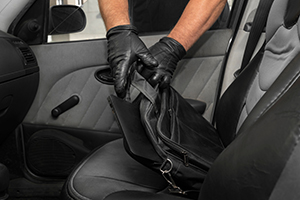Larceny in the Fifth Degree — C.G.S. § 53a-125a

Fifth-degree larceny is Connecticut’s mid-range misdemeanor theft when the State claims more than $500 up to $1,000 in property or services. These cases often come from retail incidents, marketplace meetups, deposits that never turn into work, and small equipment disputes. The outcome usually turns on intent, consent/ownership, and how value is calculated.
The Law — C.G.S. § 53a-125aA person commits larceny in the fifth degree when they wrongfully take, obtain, or withhold property or services from another with intent to deprive the owner, and the value is over $500 and up to $1,000 (or another scenario in the statute applies). Classification: Class B misdemeanor.
Penalties for Larceny in the Fifth DegreeIf convicted, potential exposure includes:
- Up to 6 months in jail
- A fine up to $1,000
- Up to 2 years of probation
- A misdemeanor theft record that can affect jobs, licensing, housing, and immigration
A shopper exits with a $660 jacket and $70 cap without paying. The combined value sits squarely in the $501–$1,000 range.
2) $900 Marketplace “Test Drive” (Chargeable Under § 53a-125a)A buyer takes a $900 camera “to check the shutter count” and never returns or pays. If evidence shows an intent to keep it, fifth-degree fits.
3) $640 Deposit With No Performance (Chargeable Under § 53a-125a)A contractor accepts a $640 deposit, never orders materials, and blocks the customer. Where facts indicate intent to defraud from the start, prosecutors file fifth-degree.
4) $480 Gym-Locker Phone (Not chargeable Under § 53a-125a)Taking a $480 phone is still larceny, but not fifth degree—the value is $500 or less, which generally falls into sixth-degree larceny.
Related Offenses (Similar Crimes With Statutes)- Larceny in the First Degree— C.G.S. § 53a-122
- Larceny in the Second Degree— C.G.S. § 53a-123
- Larceny in the Third Degree— C.G.S. § 53a-124
- Larceny in the Fourth Degree— C.G.S. § 53a-125
- Larceny in the Sixth Degree— C.G.S. § 53a-125b
- General Larceny / Theft of Services (definitions)— C.G.S. § 53a-119
- No intent to steal — self-checkout confusion, item mix-ups, or honest misunderstanding about ownership/payment.
- Value below threshold — credible proof the fair-market value is $500 or less drops the degree.
- Claim of right / consent — you reasonably believed you had permission or authority to take/use the property or service.
- Proof gaps — weak video, shaky ID, missing chain of custody, or thin evidence of “withholding.”
- Civil vs. criminal — a poor business deal or late performance is not a crime without proof of fraudulent intent.
For fifth-degree matters, we often pursue non-conviction outcomes where the facts support it. If the accelerated rehabilitation program is the right tool, we build a concise plan—verified restitution, a short loss-prevention or accountability course when appropriate, and a clean compliance track—to justify dismissal and erasure. If the valuation looks padded or the intent element is weak, we litigate first and hold diversion in reserve.
FAQs About C.G.S. § 53a-125a1) What Dollar Range Applies?Over $500 and up to $1,000, based on fair-market value at the time and place of the incident.
2) Do Sale Prices or Used Condition Matter?Yes—value turns on current fair-market value, not just MSRP. Condition and active sales count.
3) Is Shoplifting Automatically Fifth-Degree?Only if the total hits $501–$1,000. Lower totals typically fall into sixth degree; higher totals move up.
4) Can Separate Items Be Combined to Reach $500+?Sometimes, if taken in a single episode or scheme. We often challenge improper aggregation.
5) Does Returning the Property End the Case?Return/restitution helps outcomes but doesn’t automatically dismiss charges.
6) What About Deposits for Work?It’s criminal only if the State proves intent to defraud (e.g., taking money with no plan to perform). Otherwise, it’s a civil dispute.
7) Will I Go to Jail for a First Offense?Jail is unlikely for first-timers with restitution and a clean history; diversion or non-jail resolutions are common.
8) Does This Cover Services as Well as Goods?Yes—services (like meals, rides, labor) are covered and use the same value band.
9) What Evidence Matters Most?Receipts, messages, video, and timelines showing payment attempts, consent, or immediate correction efforts.
10) What Should I Do Right Now?Avoid statements and posts. Preserve receipts, texts, emails, and let counsel manage contact with the store or complainant.
Conclusion & Call to ActionA checkout mistake or deposit dispute shouldn’t follow you for years. Reach me at (203) 357-5555 or the contact page and we’ll get in front of this—calmly and quickly.
 Allan F. Friedman Criminal Lawyer Home
Allan F. Friedman Criminal Lawyer Home











